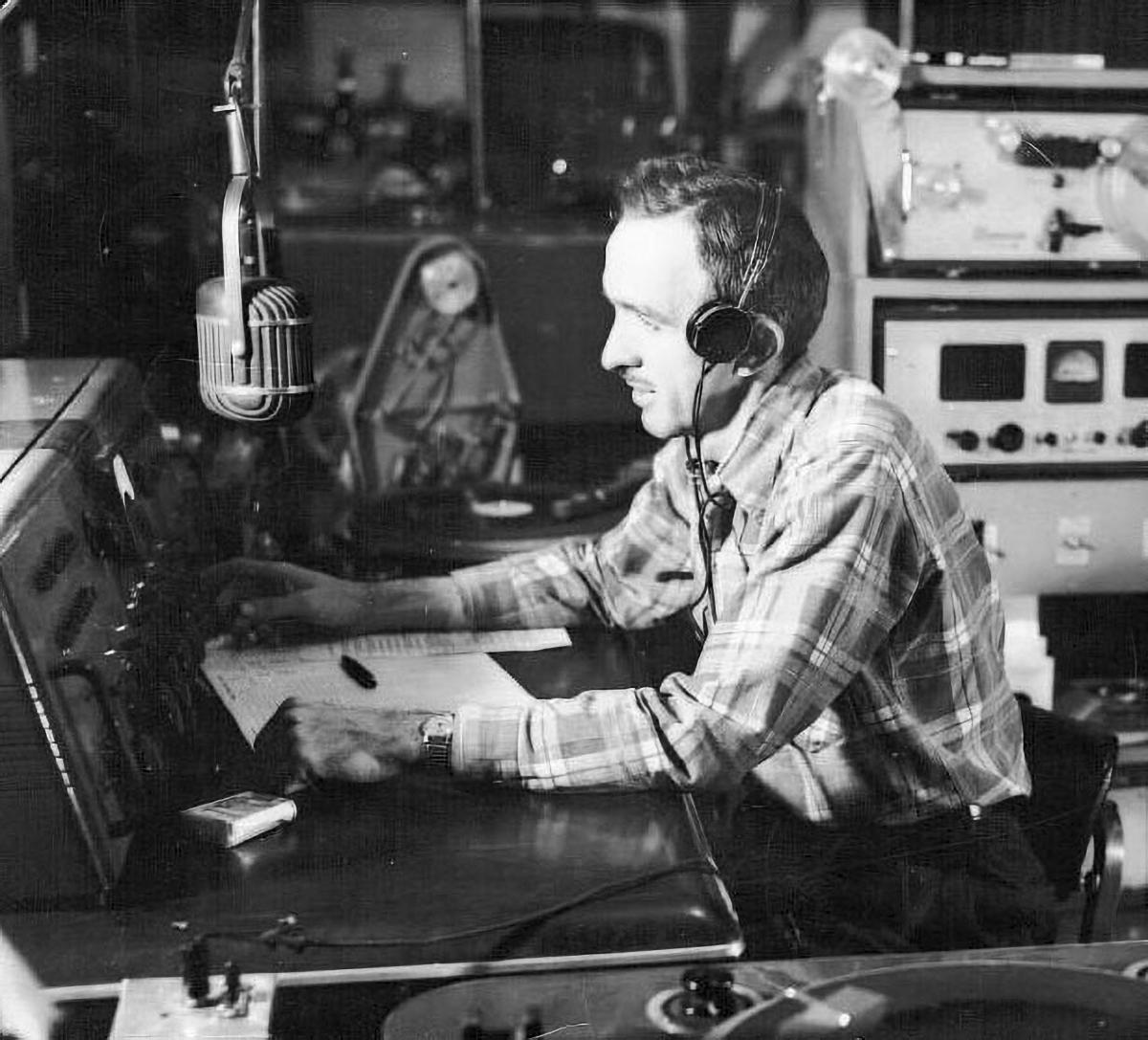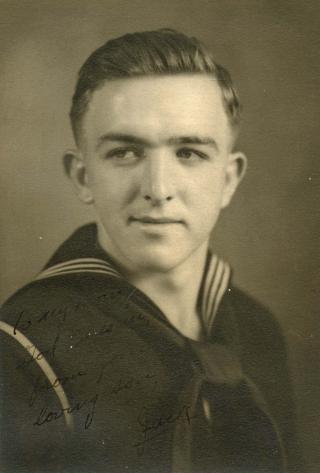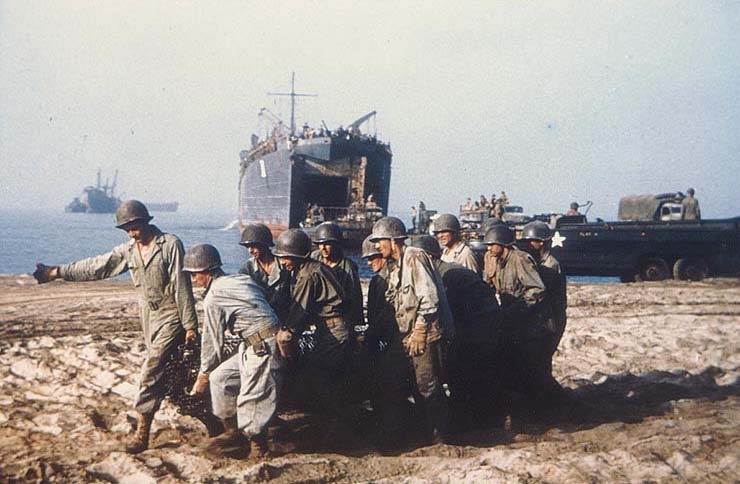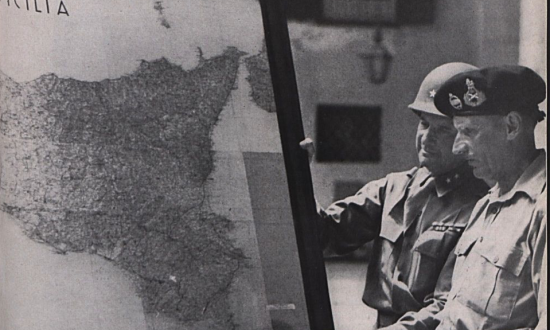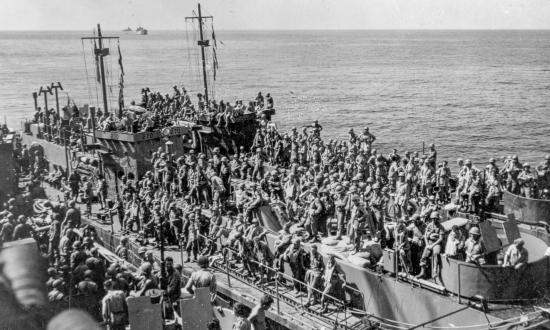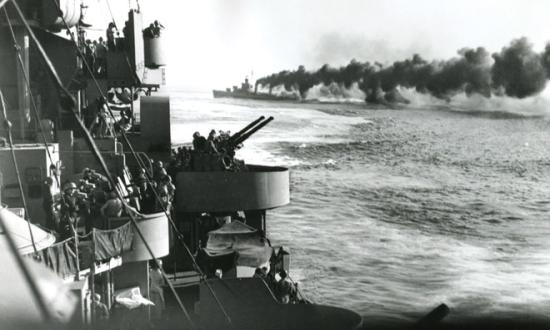“Radioman” Jack McMullen was living the best story he would ever have to tell, the most exciting yarn anyone could imagine broadcasting to their listeners across western Pennsylvania . . . well, sort of. This future DJ was not in Pennsylvania, and not even in the United State, McMullen was in a crash course on wireless transmission skills, under pressure, where he was known as Radioman First Class John McMullen, now four years into a six-year stint with the U.S. Coast Guard. His broadcast studio was on board the USS LCI 324, plowing through the waves off Salerno, Italy. His creative instincts were in abeyance; the horrific sights and constantly changing details of the carnage and confusion around him occupied his airtime, there was no script and coverage was supremely small—other isolated radio receivers bobbed in the water all around him, one to a ship, and his audience consisted of other operators. There were no commercial breaks, no station identification jingles—just harried, frantic messages that spelled immediate life or death to hundreds of Americans, if not Jack himself. Undoubtedly, this would be his most important broadcasting experience, and one that almost no one would ever hear. It would not be recorded and would never bear his name.
(Courtesy of the Author)
Someday, the creative spinning of the news, carefully dove-tailed music selections, and just the right inflection in his voice would be trademarks of his on-air personality—in much calmer waters. Years down the road, his persona would become well known to listeners across Fayette County, Pennsylvania, and beyond. McMullen’s words would find their expression in the speeches of Governor David Lawrence. His recollections would populate the Penn State Historical Voice Archives. But 1943 was more interested in defeating an insidious enemy and gaining a foothold that might lead to the downfall of a decidedly sinister foe—Nazi Germany. And John Anthony McMullen's first radio gig played a vital part in the early days of that effort.
Through a chance encounter with an antique dealer in Pittsburgh, Jack’s story found me. A point of interest in the lot being sold was a World War II Sterling-silver dog tag. Like most people, I never knew these tags had been made of Sterling, and so, with the intrigue that comes from those fateful words, “I've never seen one of those before,” I was hooked. A quick thumb-and-forefinger cleanup revealed important information about the original owner and I began a search to know more. The tag said, in clean stamped lettering, “McMullen, John A 220-220 O T5-42 USCG.”
This tarnished chunk of precious metal was loose in a manila envelope, along with a photo, some Coast Guard patches, a single-page letter, and a citation certificate. But the story contained therein was not obvious at first. Surely there was more to this man than name, serial number, and blood type, and my interest was piqued. At the time, I knew little about the Coast Guard’s role in World War II, but I would soon learn more about its proud history of valor and the dedicated service Coast Guardsmen rendered. From the Coast Guard’s role in safeguarding U.S. coastal waters, to piloting combat landing craft in every theater of war, the bravery of Coast Guardsmen contributed to ultimate victory. And on Monday, 20 September 1943, this same dog tag hung around Jack's neck as he wrote home to Uniontown:
J A McMullen RM 1/c
LCI (L) 324
Flotilla Four
C/O Fleet PO
N.Y.C/N.Y.
My Dearest Lee,
We have just learned that the censorship has relaxed so that I can tell you a few of the things we have been doing.
We were in the Sicilian Campaign throughout. It was a doozy. We left North Africa in the afternoon and golly, it was rough. We approached the beach at Sicily early in the morning . . . there was some spasmodic shell-fire and a great deal of machine gun cross-fire. It was an exciting, nerve-straining affair from the beginning to end. But, strangely the aircraft were not so bad and the shore batteries were not too bad. Ships were getting hit all around us but we faired OK. We went back and forth from Sicily to North Africa four times during the siege carrying troops and supplies.
This is a far cry from peaceful Fayette County. While this might seem to be enough excitement for one lifetime, the landings on Sicily were only a preface of a much more difficult assault, and one that would face fierce resistance. Salerno, on the west coast of Italy, would be the first Allied foothold in a Europe that was almost entirely under Axis control. Jack continued:
We were in the invasion of Italy proper--Whew! That was terrible and we were very fortunate. We arrived off the mainland, in broad daylight at about noon. We were attacked quite heavily all day and night, and we beached under a heavy shore barrage and machine gun fire. It was the heaviest I’ve ever been under or ever hope to be under again. The beach that we landed troops on was counter attacked and taken right after we got off. But the forces recaptured it the next day. After we came off of the beach, we stayed right there, within range of the shore batteries . . . We were under constant air attack night and day, every hour or so. But our luck still held out. We are all intact. We have been back to North Africa and returned to Italy once since the initial landing and we’ll probably go again soon. Just making a beachhead at our point on the Italian mainland was considered a major victory.
A lot of the sights were sickening and heart-breaking…they were magnificent yet terrible. I got on the beach twice, saw some real nice-looking Germans—dead ones! Thanks millions for your prayers, they were certainly needed. I can’t give you a very good idea of how it was without breaking censorship rules!
All my love, and good night honey
Your loving husband, Jack
Normandy has eclipsed earlier assaults on Europe. Long before 6 June 1944, the Allies were fighting and dying in Italy. Salerno was the first successful step in that work. But, in the early hours and days of the landing, it came very close to failing. The circumstances are a bit peculiar. By the time of the beach assault, Italy had surrendered to the Allies, and Mussolini had been deposed. The invaders were not met by the Italians, but by the occupying Germans, who wanted desperately to hold Italy and throw the Allies back into the Mediterranean. By September 1943, having lost North Africa only months earlier, another retreat was unthinkable for them.
The impending Salerno landing was no secret to the Germans. Their Luftwaffe had been monitoring the flotilla’s approach—harassing it and reporting on its progress. The U.S. and British commanders (U.S. General Mark Clark and the British victor of North Africa Bernard Montgomery) knew this but went ahead anyway. Yet, part of the Allied plan had been to forego a naval shelling of the area to achieve surprise. As the troops flooded the beachhead, German loudspeakers aimed at the beach proclaimed “Come on in and give up. We have you covered!” So much for surprise!
German counterattacks came within four days, nearly driving the liberators back into the sea. But the beachhead held. U.S. paratroopers were used here for only the second time, helping to stave off defeat and bringing battle-tested experience to the 82nd Airborne Division. In less than ten months, their skills would be tested in Normandy. Another participant of note was the 45th Infantry Division, lately the Oklahoma National Guard. Its advance into Europe would be punctuated with the discovery and liberation of Dachau Concentration Camp in April 1945, just days before the war’s end in Europe.
In the end, the cost of this first European foothold was not cheaply won. U.S. ground forces suffered more than 3,700 men killed, wounded, or missing, and the tally for Great Britain topped 7,000. The U.S. Navy lost more than 1,200 men as well, and the Royal Navy would add 125 to its grand total. Part of this macabre tally was an unusually high number of missing, numbering more than 4,000 between the United States and Britain. Some would turn up at war’s end in German POW camps, but many would not and were simply gone forever, leaving no trace. Jack made it through all this, while many others around him did not. But, as he wrote, his “luck still held out.”
This “Bloody Salerno” was only 11 days distant as Jack wrote his remarkable letter. The LCI 324 would go on to glory in the D-Day Normandy landings, but Jack was not on board. He left the ship in late March 1944, three months before the big event, and returned to the United States. His last ship assignment was on board the USCGC Galatea, a cutter that patrolled the eastern U.S. coastline. No combat. No beaches littered with Germans. And probably exactly the kind of service he expected back in September 1939 when he signed up for what would be the biggest adventure of his life.
Theodore Roosevelt referred to the test of his courage and tenacity at San Juan Hill in 1898's Cuba as his "crowded hour.” I do not know if Jack’s recollections of his own “crowded hour" ever figured into his radio broadcasts, or his oral history recordings. But, through a strange encounter with a silver dog tag, and one of his many letters home, John Anthony McMullen has a second chance to recount his small part in the greatest military effort the world has ever known.



